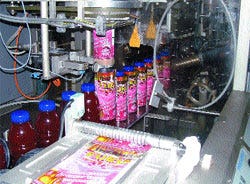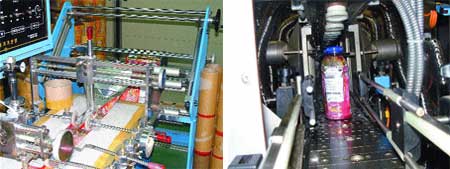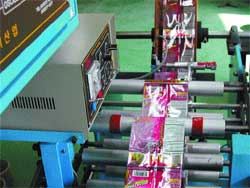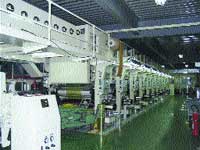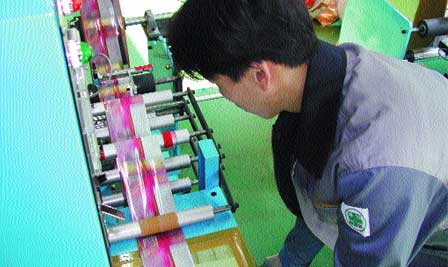Muscular move to the next phase in decorating
January 29, 2014

As beverage marketers continue their relentless rush into full-body labels, the novelty starts shrinking. There has to be an overpowering point-of-sale difference to justify the change from traditional labeling.
Now there is. With the September opening of its facility in Seoul, South Korea, Worldpack is expanding not only the quantity but also the range of its film-converting capabilities to provide that point of difference.
On the ground floor in a 75,000-sq-ft area of its new three-story building, Worldpack is converting a vacuum-metallized vinyl that won't shrink during the process or flake after it; one that embodies a muscular move to the next phase of decoration.
And, as one of the first marketers to jump on the innovation, the Largo,
|
At the contract packager's operation, PET bottles are filled and capped automatically, with shrink labels applied by a single-head sleever. |
FL-based Breakthrough Engineered Nutrition (BEN) subsidiary of Innovative Health Industries is, as of last month, shipping 20-oz bottles of its Thermo Fuel Dietary Supplement decorated with the metallized shrink labels to gymnasia and fitness centers nationwide. "We anticipate the impact of these labels will be as strong as the products," BEN sales vp Nate Bernstein advises PD. "We expect to leverage the new packaging to emerge in a much better position against our competitors," he adds.
Used primarily to offset the trade name, the silver metallic of the 50-micron full-body shrink labels also supports the primary color for each of three flavors?cranapple, lemonade and grape. This is important, Bernstein notes, because Thermo Fuel, described as a thermogenic and energy formula, rates taste as a major point of departure from competitors' products.
Full-body press
BEN's label series, now being expanded for tangerine and fruit punch extensions of the Thermo Fuel line, is being printed on a new 10-color rotogravure press, a Model RP-1300-10, made by Hwa Shin Machinery Co. A second is on order and will be installed shortly, PD is informed by Worldpack sales vp Christopher Frank, at the company's Buena Park, CA, headquarters. "As word gets out," he says, "demand is starting to rise dramatically."
|
Seaming, following slitting of the web, left, is fully automated in the converter's new plant, which occupies 75,000 sq ft in a three-story building. Because of materials and printing innovations, right, label metallics aren't affected as the bottles move through the shrink tunnel. |
He explains, however, "What's really critical here is what happens before the web arrives at the press. Two years ago, for another marketer, we solved the flaking problem with vacuum-metallized vinyl, running 226 tests and adjusting various primers and adhesives. Then the client decided against the product introduction.
"Since then, we've fine-tuned the technique and materials even more, so when Breakthrough Engineered Nutrition was looking for a unique, high-impact label, we had our own breakthrough, all ready and waiting. With the concentration in our new plant of our other capabilities in South Korea, which is still going on, it all came together perfectly."
|
Following printing and slitting, a web of seamed labels conveys to rewind and final packoff for shipment. |
On the shaftless gravure press, the Thermo Fuel web is reverse-printed two-up in a total of nine colors with a double bump of white for improved contrast. At the tenth station, a clear proprietary coating is applied. The press, rated to 250 m/min, provides PLC-moderated unwind through digital line drive. It affords a cold-seal capability and runs with solvent-based and solventless inks.
After completion of printing, webs are slit and seamed automatically and are prepared for shipment.
Parking in California
The webs cross the Pacific Ocean and alight in Buena Park, but not at Worldpack. Rather, they are delivered to its neighbor, contract packager Ameripec. Here, the bottles are filled, capped and labeled, says Ameripec general manager Ed Muratori, on "some pretty sophisticated, fast equipment."
This includes a monobloc consisting of U.S. Bottlers Machinery's 48-station rotary gravity filler and its 15-head capper. Containers from these lead into American Fuji Seal's Model 3300 single-head sleever and tunnel.
| A new 10-station gravure press, left, rated at 250 m/min, is PLC-moderated from unwind through digital line drive. The printed and seamed web, below, undergoes a final visual inspection in the converter's plant. |
|
BEN's bottles are extrusion/blow-molded of polyethylene terephthalate by Graham Packaging, and are topped by injection-molded polypropylene CT closures produced by Owens-Illinois. The closures are made with tamper-evident breakaway rings.
For Worldpack, which is also using the Seoul plant to convert webs for retort pouches and other applications with various films, the BEN labels symbolize not only the strength the bottles communicate to consumers, but also its own growth potential in the years ahead.
That message comes through clearly and powerfully.
More information is available:
Labels: Worldpack, 714/670-1661. Circle No. 221
. Press: Hwa Shin Machinery Co., +51 727 8815. Circle No. 222.
Contract packaging: Ameripec, 714/994-2990. Circle No. 223.
Filler/Capper: U.S. Bottlers Machinery Co., 704/588-4750. Circle No. 224.
Sleever/shrink tunnel: American Fuji Seal, 973/882-5600. Circle No. 225.
Bottle: Graham Packaging, 717/849-8500. Circle No. 226.
Closure: Owens-Illinois, 800/537-0178. Circle No. 227.
About the Author(s)
You May Also Like
